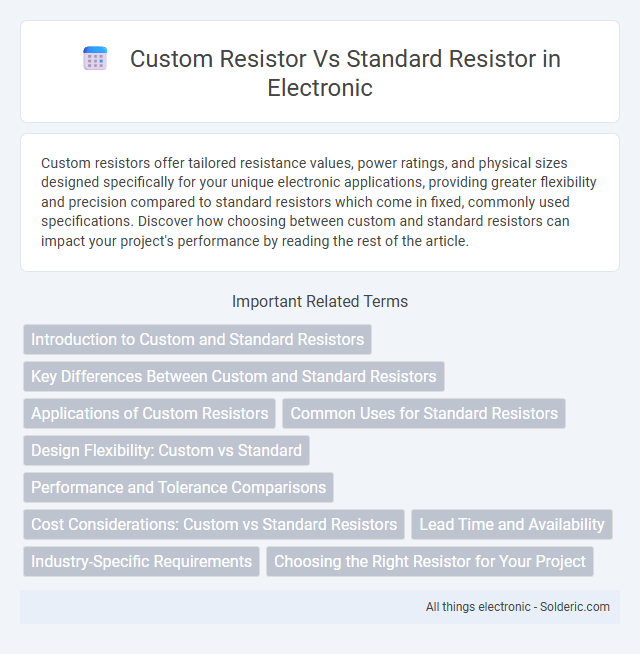Custom resistors offer tailored resistance values, power ratings, and physical sizes designed specifically for your unique electronic applications, providing greater flexibility and precision compared to standard resistors which come in fixed, commonly used specifications. Discover how choosing between custom and standard resistors can impact your project's performance by reading the rest of the article.
Comparison Table
| Feature | Custom Resistor | Standard Resistor |
|---|---|---|
| Resistance Value | Specified by customer, exact value | Predefined standard values (E12, E24 series) |
| Tolerance | Custom tolerance options (e.g., +-0.1%) | Common tolerances (+-1%, +-5%) |
| Power Rating | Tailored to specific application needs | Standard power ratings (0.125W, 0.25W, 0.5W, etc.) |
| Lead Time | Longer due to custom manufacturing | Short, readily available stock |
| Cost | Higher unit cost, lower volume | Lower unit cost, mass-produced |
| Applications | Specialized, precision circuits | General purpose, standard electronics |
Introduction to Custom and Standard Resistors
Custom resistors are designed to meet specific electrical requirements such as unique resistance values, power ratings, and tolerance levels, making them ideal for specialized applications in advanced electronics. Standard resistors, on the other hand, are mass-produced with fixed resistance values and widely accepted tolerances, offering cost-effective solutions for general use. The choice between custom and standard resistors depends on the precision, performance needs, and production volume of the electronic device.
Key Differences Between Custom and Standard Resistors
Custom resistors offer tailored resistance values, power ratings, and physical dimensions designed to meet specific application requirements, unlike standard resistors which provide fixed, mass-produced specifications. Standard resistors typically adhere to common industry values and sizes, ensuring compatibility and cost-effectiveness for general use, while custom resistors enable precise performance optimization in specialized electronic circuits. Customization also extends to unique tolerance levels and packaging options, which enhances reliability in demanding environments compared to the broader tolerances and limited configurations of standard resistors.
Applications of Custom Resistors
Custom resistors offer precise resistance values and unique form factors tailored to specific applications where standard resistors cannot meet exacting requirements. They are essential in specialized electronics, aerospace systems, medical devices, and precision instrumentation that demand exact tolerance, power ratings, and environmental resistance. Your projects benefit from enhanced performance and reliability when using custom resistors designed to fit unique circuit conditions and application constraints.
Common Uses for Standard Resistors
Standard resistors are commonly used in electronic circuits for tasks such as current limiting, voltage division, and signal conditioning. Their predefined resistance values and tolerances make them ideal for mass production and general-purpose applications in consumer electronics, automotive systems, and industrial machinery. You can rely on standard resistors for consistent performance in everyday electrical and electronic designs.
Design Flexibility: Custom vs Standard
Custom resistors offer significant design flexibility by enabling precise tailoring of resistance values, power ratings, and physical sizes to meet specific application requirements, whereas standard resistors come in fixed, pre-defined specifications. This flexibility in custom resistors supports unique circuit designs and advanced performance parameters, including tighter tolerance levels and specialized materials for enhanced reliability. Standard resistors are suitable for general-purpose use but may limit optimization in high-performance or space-constrained electronic designs.
Performance and Tolerance Comparisons
Custom resistors offer superior performance and tighter tolerance levels compared to standard resistors, enabling precise control in critical circuit applications. Standard resistors typically have tolerance ranges of +-5% to +-10%, whereas custom resistors can achieve tolerances as low as +-0.1%, resulting in enhanced accuracy and stability. This precision in custom resistors reduces variability and improves overall circuit reliability and performance consistency.
Cost Considerations: Custom vs Standard Resistors
Custom resistors generally incur higher costs due to specialized manufacturing processes and lower production volumes compared to standard resistors, which benefit from economies of scale. Your choice between custom and standard resistors should factor in the budget impact of customization requests, such as precise resistance values or unique physical sizes. Standard resistors offer cost savings for typical applications, whereas custom solutions justify their expense through tailored performance and specifications.
Lead Time and Availability
Custom resistors typically have longer lead times compared to standard resistors due to specialized manufacturing processes and lower production volumes. Standard resistors benefit from higher availability, stocked in large quantities across multiple suppliers, enabling faster order fulfillment. Your choice between custom and standard resistors should factor in project deadlines and inventory accessibility.
Industry-Specific Requirements
Custom resistors are designed to meet precise industry-specific requirements that standard resistors often cannot fulfill, such as unique resistance values, power ratings, and physical dimensions tailored to specialized applications. Industries like aerospace, medical devices, and automotive demand custom resistors for enhanced reliability, temperature stability, and compliance with stringent regulations. Your projects benefit from optimized performance and longevity when using resistors engineered to industry specifications rather than generic standard components.
Choosing the Right Resistor for Your Project
Choosing the right resistor for your project depends on specific electrical requirements such as resistance value, tolerance, power rating, and environmental conditions. Custom resistors offer tailored specifications including unique resistance values, precise tolerances, and specialized materials that standard resistors may not provide. Standard resistors are cost-effective and widely available but may not meet specialized performance needs in high-precision or demanding applications.
custom resistor vs standard resistor Infographic

 solderic.com
solderic.com